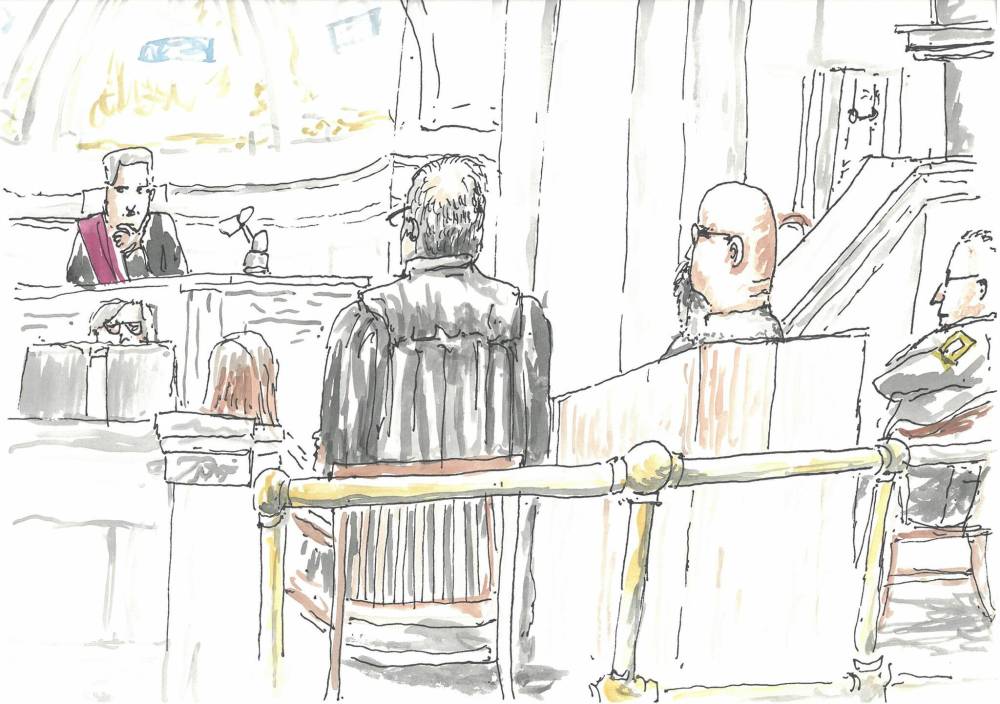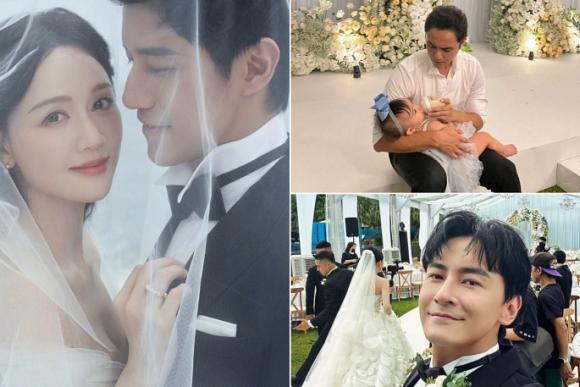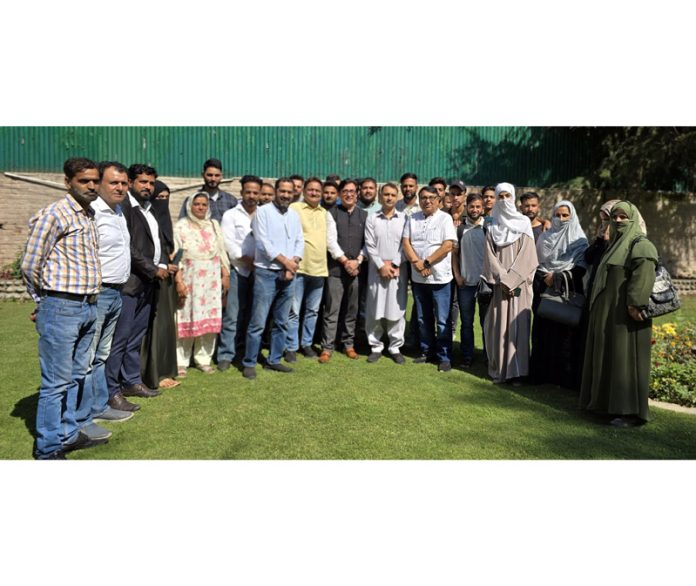During his sentencing by Court of King’s Bench Chief Justice Glenn Joyal Wednesday for the first-degree murders of four Indigenous women, serial killer Jeremy Skibicki was asked three times by the judge to stand up. Read this article for free: Already have an account? To continue reading, please subscribe: * During his sentencing by Court of King’s Bench Chief Justice Glenn Joyal Wednesday for the first-degree murders of four Indigenous women, serial killer Jeremy Skibicki was asked three times by the judge to stand up. Read unlimited articles for free today: Already have an account? Opinion During his sentencing by Court of King’s Bench Chief Justice Glenn Joyal Wednesday for the first-degree murders of four Indigenous women, serial killer Jeremy Skibicki was asked three times by the judge to stand up.
He refused each time. Finally, after instructions quietly delivered by his lawyer, Skibicki rose. JAMES CULLETON COURT SKETCH / FREE PRESS FILES Court of King’s Bench Chief Justice Glenn Joyal asked Jeremy Skibicki three times to stand up.

Joyal then asked him if he had anything to say. “No,” Skibicki told the court. It was a symbolic end to a horror-filled trial, an indelible reminder of how far this often-apathetic country needs to go to end the scourge of murdered and missing Indigenous women and girls.
Skibicki will now serve his four “life sentences” concurrently, which means 25 years before being allowed to apply for parole. That means the 37-year old murderer could potentially be freed when he’s in his early 60s. Many others — especially the victims’ families and friends, but also the community at large — will continue feeling the pain and living the trauma of their losses at least that long and, likely, well beyond.
The trial and conviction of B.C. serial killer Robert Pickton raised still-unanswered questions and revealed systemic racism and sexism in the efforts multiple police forces put into investigations into his victims’ disappearances.
Pickton, who murdered at least 26 women, mainly sex workers and drug addicts from Vancouver’s Downtown Eastside, was arrested in 2002; Canadians are still conducting inquiries and compiling hundreds of recommendations for change — most of them repeated over and over again. The Skibicki case has, just in two years, pointed to similar concerns of racism in the Winnipeg Police Service in its quick decision to not search a Winnipeg-area landfill for two women’s remains, determined the outcome of a provincial election and forced governments to pay attention and expend resources. Imagine what’s yet to come.
Most upsetting is how similar the violence was in the Skibicki and Pickton cases. Not every Canadian province has a serial killer but all have multiple incidents of brutal and bloody Indigenous femicide. Even Prime Minister Justin Trudeau has accepted the conclusions in the final report of the National Inquiry into Murdered and Missing Indigenous Women and Girls — a “genocide” of Indigenous women, girls, and two-spirit peoples is underway.
Yet, the violence continues and, with it, apathy and injustice. A month ago, the Assembly of First Nations released a report revealing that about 50 of the 231 MMIWG inquiry’s calls for justice are “in process” — with just one having been completed. The most ironic part of the report is a section entitled “Steps Backward 2019-2024,” which explains numerous ways Indigenous families have seen their resources cut, Indigenous policing is mismanaged, Indigenous incarceration has increased, housing has deteriorated in Indigenous communities and provincial legislation on parental rights has led to suicide epidemics and harm for Indigenous transgender and two-spirit youth.
I feel like a broken record listing, yet again, all the ways Canadian institutions fail to address the issue of murdered and missing Indigenous women and girls. I just did it again. The victims of Jeremy Skibicki: Morgan Beatrice Harris (from left), Marcedes Myran and Rebecca Contois.
There was, however, one small — but significant — part of Wednesday’s court hearing worth noting. Before sentencing Skibicki, Joyal provided the time for more than a dozen family members and community leaders to deliver victim and community statements describing the ways the deaths of Rebecca Contois, Marcedes Myran, Morgan Harris and Mashkode Bizhiki’ikwe (Buffalo Woman) have impacted them and those around them. Victim impact statements, of course, have been around a long time.
But the sheer volume and scope of the statements read into the record Wednesday is worth a moment of reflection. Typically, when guilt is the verdict in a first-degree murder trial, the sentence is pre-determined: a life sentence, and the judge pronounces it immediately. Skibicki was found guilty almost six weeks ago, on July 11.
At that time, Crown attorneys asked Joyal to provide the opportunity for victims’ families and communities to speak before sentencing. Joyal agreed, and families and community leaders went to work talking, listening and recording the way the crimes and trial impacted thousands of people. For the community statements, for example, sessions were held in Winnipeg, Thompson, The Pas, and Brandon and produced an end product that went well beyond the Skibicki trial, diagnosing and prescribing recommendations to deal with the epidemic of MMIWG across Canada.
Joyal also allowed people who attended court to carry posters and paintings into the courtroom, meaning even more voices were included, amplifying the cheers and applause that erupted when Skibicki was led out at the hearing’s end, breaking the silence. Monday mornings The latest local business news and a lookahead to the coming week. All of it is now a part of the public record, and was reported by the assembled media members from across Canada and, even, the world.
Unlike a social media post, a speech or a government report that can be easily ignored, the statements shared during Skibicki’s sentencing must also be considered when it comes time to determine his eligibility for parole. At that time — in 2049 — the lives of four beautiful, cruelly-terminated Indigenous women’s lives and the MMIWG issue will resurface. And, with it, more of the silence, the apathy and, perhaps, even the injustice will have diminished.
[email protected].
ca Niigaan Sinclair is Anishinaabe and is a columnist at the Winnipeg Free Press. Our newsroom depends on a growing audience of readers to power our journalism. If you are not a paid reader, please consider .
Our newsroom depends on its audience of readers to power our journalism. Thank you for your support. Niigaan Sinclair is Anishinaabe and is a columnist at the Winnipeg Free Press.
Our newsroom depends on a growing audience of readers to power our journalism. If you are not a paid reader, please consider . Our newsroom depends on its audience of readers to power our journalism.
Thank you for your support. Advertisement Advertisement.



















